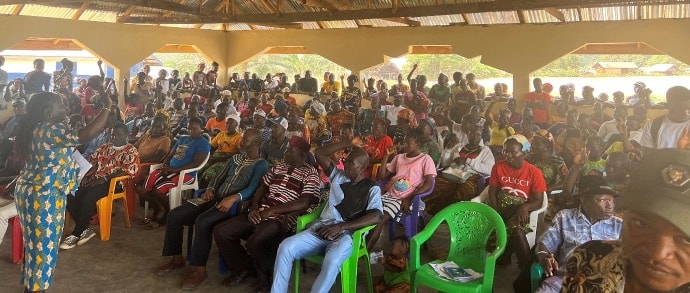Posted on July 8, 2025
By Gmasonah Togba Aboah, Land Tenure Specialist

Everlyne Nairesiae (left) speaking before the CSA training for Diagmah Clan
Year after year, following the cassava harvest, Beatrice Sumo would cut down the remaining stalks and burn her field to clear it for the next planting season.
This agricultural method—sometimes known as “slash-and-burn”—is prevalent where Beatrice lives in rural Bong County, Liberia. It is also common for farmers to use synthetic fertilizers and cut down trees to clear land and produce charcoal. As climate change degrades their land, it has become increasingly difficult for members of Beatrice’s community to produce enough food to last through the year. Farmers are stuck in a vicious cycle: the agricultural methods they rely on to survive are the very ones that destroy soil fertility and reduce climate mitigation potential.
Continue Reading
Posted on July 8, 2025
By Heifer International

Jose
Like many of the farmers in his small community near Colonia Yucatán in Eastern Mexico, José Eliseo Uicab Ay rises before the sun comes up. He sets out from his home, traveling almost two miles down a narrow, tree-lined path to his milpa, a tract of land for cultivating crops amid the surrounding subtropical jungle endemic to the Yucatán peninsula.
Continue Reading
Posted on July 8, 2025
By Emily Whitehouse, Diversity Travel
 The urgency for climate action is growing. Following COP29, where 50 countries backed a call for enhanced climate action in tourism, it’s clearer than ever that the travel sector has a major role to play.
The urgency for climate action is growing. Following COP29, where 50 countries backed a call for enhanced climate action in tourism, it’s clearer than ever that the travel sector has a major role to play.
At Diversity Travel, we’re always looking for ways to make a positive impact, and we know many of our clients are too. That’s why we’re excited to announce the launch of several major enhancements to our online booking tool, designed to make sustainable travel easier and more accessible than ever before.
These new features empower travelers to reduce their environmental impact right from the point of booking. Whether it’s choosing rail over air, offsetting carbon emissions, or filtering for eco-certified hotels, we’re putting sustainability front and centre.
Continue Reading


 The urgency for climate action is growing. Following COP29, where 50 countries backed a call for enhanced climate action in tourism, it’s clearer than ever that the travel sector has a major role to play.
The urgency for climate action is growing. Following COP29, where 50 countries backed a call for enhanced climate action in tourism, it’s clearer than ever that the travel sector has a major role to play.